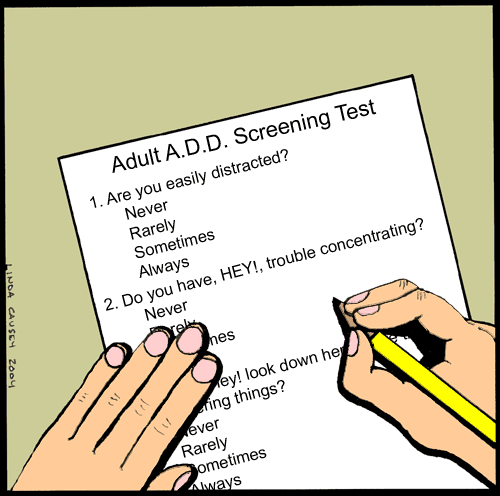

#Childhood add test manual
The manual lists three presentations of ADHD–Inattentive, Hyperactive-Impulsive and Combined and the symptoms for each. What are the symptoms of ADHD in childrenĪ diagnosis of ADHD is based on The Diagnostic and Statistical Manual of Mental Disorders (DSM 5).
#Childhood add test professional
The professional may also suggest other psychological tests to help understand your preschooler’s strengths and weaknesses in learning and thinking skills and screen for learning disabilities.

The ADHD professional will conduct a detailed review of your preschooler’s school and medical records, talk with and observe your child directly, and check for other conditions your child may have along with ADHD. You and your child’s teachers or child care providers will be asked to complete questionnaires with rating scales to evaluate your child’s behavior. These guidelines recommend a detailed interview with you to determine how long the symptoms have been going on, how severe they are, how often they occur and in what settings. It is also important to have your child checked for other conditions such as vision, hearing, or sleep problems because sometimes the symptoms look like ADHD.Įvaluations for preschoolers should be thorough and follow the guidelines outlined by the American Academy of Pediatrics (AAP) and the American Academy of Child and Adolescent Psychiatry (AACAP). If you suspect that your preschooler has ADHD, you will want to talk to a professional who is trained to diagnose and treat ADHD such as your child’s pediatrician, a child psychiatrist, psychologist, clinical social worker or other qualified mental health clinician. For example, if your child has behaviors at home that may look like ADHD but does not have these behaviors in situations outside the home, there may be another explanation. To be diagnosed with ADHD, a child must have a specified number of symptoms for at least 6 months that show up in more than one area of life. What is involved in having my preschooler evaluated for ADHD Ask yourself, “When compared with other preschoolers of the same age, where does my child’s behavior fall” Talking with your preschooler’s teachers and/or childcare providers can let you know what are common behaviors in young children and not related to a disorder and what is of more serious concern. These kids have more trouble learning concepts at school, and many get special education placements at a very young age when compared to children without ADHD.Īs a parent, you will want to know where your child’s behaviors fit along a range of behaviors that are typical of kids the same age. Preschoolers with ADHD are more likely to be suspended from school or daycare because of their disruptive behavior. How can I tell if my preschooler has ADHD Research shows that 3-year-olds who show symptoms of ADHD are much more likely to meet the diagnostic criteria for ADHD by age 13. Some children outgrow the symptoms, but others may not. According to the 2010-2011 National Survey of Children’s Health, approximately 194,000 preschoolers (2-5 years of age) had a current ADHD diagnosis. Children as young as age 4 can be diagnosed with ADHD. This fact sheet will tell you more about ADHD in preschoolers and what to do if you are concerned about your child.Ĭan preschoolers have or be diagnosed with ADHD As a parent, you might wonder whether your preschooler has ADHD or is just being rambunctious and acting typical for his or her age. These behaviors can be common and age appropriate or they may indicate the need for an Attention-Deficit/Hyperactivity Disorder (ADHD) evaluation.

At times preschoolers may have difficulty paying attention, following directions, and waiting or taking their turn.


 0 kommentar(er)
0 kommentar(er)
